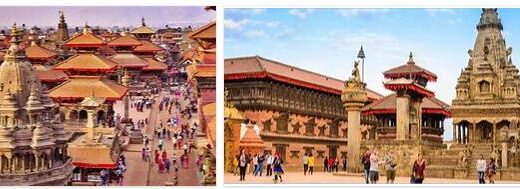Bangladesh Government and Politics
The Awamiliga regains power

Through 1994, 154 politicians in opposition to the Kaleda Zia government boycotted parliamentary work to collectively resign in December. The leader of the Awamil League, Sheikh Hasina, in 1994-95 led a series of peasant demonstrations that required the holding of elections under a neutral administration. At the February 15, 1996 elections, women voted for the first time in Bangladesh’s history. Prime Minister Kaleda Zia of the BNP retained power, but the election monitored by the military was considered electoral fraud. The Awamiliga called for paralysis of the country and this led to clashes between police and opposition activists. However, the violence did not stop when Zia had to resign on March 30. Former Supreme Court Judge Mohammad Habibur Rahman was inaugurated as interim government leader, until in June elections could be held again. On June 23, he handed over the prime minister post to Sheikh Hasina.
Social conflicts continued through 1997 to culminate in December with a series of strikes organized by opposition parties in protest of the agreement the government had signed to end an armed uprising in the southeastern country. Several days were demonstrated in Dhaka, Chittagong, Barisal, Syleht and Rajsani as well as many smaller towns. Both for and against the strike. It pretty much paralyzed the country.
In 1998, 15 million people threatened by pollution of groundwater, which is the main source of drinking water. The boreholes were contaminated with arsenic. Over the past 20 years, they had been dug under mass mobilization campaigns. The pollution threatened to further aggravate the situation of the poorest sectors of the population, in a country where 50% of newborns have too low birth weight.
In November 1999, the Bangladesh Central Bank decided to revalue the Taka currency by 3% with the stated purpose of maintaining export competitiveness. The main opposition party, the Nationalist Party, declared that this step recommended by the IMF was against the interests of the population. Not least because of the 16th devaluation since 1996. The month after, the Prime Minister expanded his government with 9 new ministers to 45 ministers. Hasina Wajid did not provide more precise justifications for enlargement but suggested that it provided greater representativeness in the government for regions that had hitherto been disadvantaged. However, it did not diminish the accusations of nepotism, as 3 of the new ministers were family members of the head of government.
During his March 2000 visit to South Asia, US President Bill Clinton highlighted Bangladesh’s efforts to fight poverty. It was the first state visit to the region by the United States in decades, but it was not without problems. Shortly after his arrival, Clinton determined that this was “the most dangerous place in the world.” A reference to the tense relations between Pakistan and India and the separatists’ efforts to detach Kashmir from India. Until 1996, partisans had been trained militarily in Bangladesh. This was confirmed a month later by Interior Minister Mohammad Nasima, who stated that this military assistance had been provided by the previous government through a foreign intelligence organization. Although it was not said, it was clear that there was talk of Pakistan’s intelligence.
In April 2000, two members of the Supreme Court declined to investigate the appeal of two former officers convicted of the 1975 assassination of then Prime Minister Sheikh Mujibur Rahaman, the leader of the country’s independence movement and the father of the country’s current prime minister Hasina Wajid. The two officers were sentenced to death in 1998. However, before the death sentence can be executed, the Supreme Court must analyze the judgment and assess the request for appeal.
In September 2001, the country authorized the United States to use its airspace, ports and airports for the invasion of Afghanistan. In November, Secretary of State Badruddoza Chowdhury traveled to Washington for talks with US Secretary of State Colin Powell. The United States wanted to secure Bangladesh ‘- one of the world’s largest Muslim countries – in its fight against terrorism. Chowdhury, in turn, hoped to reap financial benefits from this support.
After three days of negotiations in March 2002, senior diplomats from India and Bangladesh presented plans to reduce tensions along the 4,000-km-long common border. Among the measures were joint patrol of the border, and occasional meetings of military commanders along the border.



